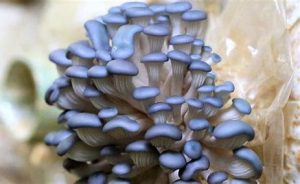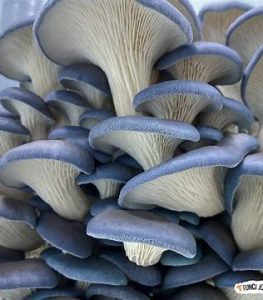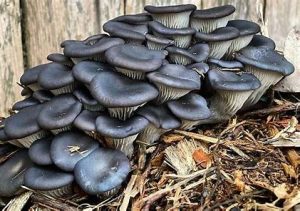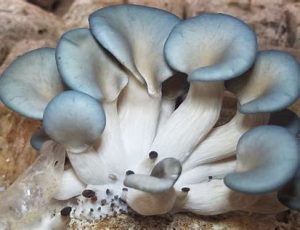What is blue oyster mushrooms: Benefits and side effects
Introduction
Blue oyster mushrooms (Pleurotus ostreatus var. columbinus) belong to the family Agaricaceae which grows in shelf or bracket-like layers. It is the third major cultivated mushroom worldwide after the white button mushroom and shiitake mushroom. These mushroom-secreted enzymes decompose dead organisms or other waste to absorb nutrients.
This mushroom grows in cluster form and grows faster than other edible mushrooms. It starts with a deep blue that turns gray as they age. It has a meaty texture, sweet flavor, and high nutritional value. This mushroom can be used in place of meat because it is more affordable and readily available than animal proteins.
click here to buy magic mushrooms in the USA
Geographical distribution
Native to central and Western Europe, this mushroom grows well in cooler temperatures.
Classification
Kingdom- Fungi
Phylum -Basidiomycota,
Class- Basidiomycetes
Family- Agaricaceae.
Nutritional value of blue oyster mushroom
This mushroom is a rich source of essential amino acids like arginine, leucine, lysine, threonine, and valinontaie. It also contains minerals such as potassium, phosphorus, iron, and zinc. Vitamins like niacin and pantothenic acid are also present in this mushroom.
Benefits of Blue Oyster Mushrooms
Blue oyster mushroom has low caloric value and is cholesterol and gluten-free. There is limited research available on this mushroom’s medicinal importance.
1. Presence of Nutraceuticals
Blue oyster mushroom contains nutraceuticals like alpha-tocopherols and beta-carotene. These compounds help to prevent disease, and promote health and medicinal properties.

2. Good source of protein
This mushroom is a good option for protein when meat sources are limited. It contains protein (25-40%) when dry and 3-7% when fresh in the shortage of meat sources.
These protein amounts are higher than other vegetables and fruits with the exclusion of peas and beans. Thus, the mushroom is an excellent source of nourishment for the diet due to its texture, dietary value, and taste.
3. Antimicrobial properties
It fights against bacteria such as Escherichia coli, Pasteurella multocida, Bacillus subtilis, and Staphylococcus aureus. Also inhibits the growth of fungal species like Candida albicans, Aspergillus niger, Aspergillus flavus, Fusarium solani, and Harpophora maydis (7).
4. Treat cancer
Oyster mushroom contains protein that acts as an antitumor agent. These agents slow down the progression of colon, breast, prostate, and leukemia cancer cells and induce apoptosis (8).
5. Antioxidant properties
Antioxidants like polyphenol, beta carotene, and ascorbic acid in this mushroom remove harmful radicals from the body. Thus this mushroom boosts the immune system, prevents oxidative stress, and protects the body from various diseases.
6. Lower cholesterol level
Intake of mushrooms burns cholesterol and increases lipid and cholesterol excretion in feces. Thus, this mushroom lowers cholesterol levels and prevents heart disease (10).
7. Manage diabetes
This mushroom contains saponins, alkaloids, flavonoids, cardiac glycosides, and especially beta-glucans . These compounds may lower the blood glucose level and may be useful for diabetic patients under dieting.
The side effect of blue oyster mushroom
There is almost no side effect of eating this mushroom. However, intake of this mushroom in high dosage may cause a health problems. Moreover, if the person has an allergy, they should avoid it and no one knows the long-term effect of this mushroom.
Recipes
Like other mushrooms, all parts of this mushroom are edible including the caps, gills, and stems. Due to its mild, savory flavor, it is used in a variety of cuisines like Chinese, Japanese, and Korean cooking.
This mushroom can be used fresh for 2 to 3 days in the refrigerator. Also can be dried or frozen and kept in a sealed container for up to three months for extended use. The mushrooms cannot be consumed raw and should be cooked to deactivate heat-labile toxins. It has a subtly metallic flavor in raw form. After cooking this mushroom not only produces a velvety, tender texture it also contains mild, earthy, and savory flavor.

Here are a few ways to incorporate these mushrooms into the diet:
- Braising, sautéing, roasting, frying, grilling, and stir-frying.
- Add fresh or dried mushrooms to soups and stews to obtain an umami flavor.
- In pasta, omelets, pizza, and burgers.
- Cook the mushroom with vegetables like parsley, thyme, sage, potatoes, garlic, green onion, shallots, ginger, lemongrass, and other herbs
- Use them in fish, meats such as beef, poultry, and turkey.
Frequent ask questions on blue oyster mushroom
1. What is a blue blue oyster mushroom ?
Blue Oyster Mushroom is a member of the Pleurotus ostreatus species that grow in a cluster form during spring and autumn. This mushroom grows well on any dead and decaying wood or paper waste. This mushroom has an attractive blue-tinted color, especially at immature stages.
2. What does a blue oyster mushroom look like?
The name of this mushroom is due to its flavor resemblance to oysters. Its solid stem is growing sideways and its smooth surface cap looks a lot like the attractive shell of an oyster. Also, these delicious mushrooms act as an excellent meat replacement because of their chewy texture and mild earthy taste.
3. Blue oyster mushroom when to harvest?
Harvesting of full-size mushrooms is done in 14-26 days.
4. Where to buy blue oyster mushroom spawn?
People can buy this mushroom online from various sites, also available in local farmer’s or food stores and markets. Spores or a kit of this mushroom are available and can grow at home.
5. What is the blue blue oyster mushroom spawn to substrate ratio?
Rice straw, paper, wood, coffee pulp, sawdust, and other cellulose-rich materials help in growing blue oyster mushrooms. A research study suggested that 3% of spawn is best for the growth of this mushroom into cardboard or rubber sawdust . Moreover, the liquid spawn is better than the grain spawn in terms of fast growth.
7 Impressive Benefits of Oyster Mushrooms
blue oyster mushroom , or Pleurotus species, are a group of gilled mushrooms. While mushrooms are classified as fungi, which are technically different from plants, they are a great addition to any meat-free diet.
There are around 40 types of oyster mushrooms, including Pleurotus ostreatus (or P. ostreatus), commonly known as the American oyster mushroom. All types are edible and are commonly enjoyed in dishes like pasta and stir-fries (1 Trusted Source ).
They’re known for their impressive health-promoting properties and contain a variety of powerful compounds. In fact, they’ve been used in traditional medicine approaches for centuries (1 Trusted Source, 2 Trusted Source ).
This article covers seven impressive benefits of oyster mushrooms.
1. Rich in nutrients
blue oyster mushroom are loaded with fiber, vitamins, minerals, and other important nutrients. They’re also low in carbohydrates, so they’re a good choice for people following low carb dietary patterns.
Here’s the nutritional content of 1 cup (86 grams) of raw P. ostreatus oyster mushrooms (3 Trusted Source ):
- Calories: 28
- Carbs: 5 grams
- Protein: 3 grams
- Fat: <1 gram
- Fiber: 2 grams
- Niacin: 27% of the Daily Value (DV)
- Pantothenic acid (vitamin B5): 22% of the DV
- Folate: 8% of the DV
- Choline: 8% of the DV
- Potassium: 8% of the DV
- Iron: 6% of the DV
- Phosphorus: 8% of the DV
- Zinc: 6% of the DV

The mushrooms also contain smaller amounts of other nutrients, including vitamin D and selenium.
SUMMARY
blue oyster mushroom are a good source of fiber, protein, and a variety of vitamins and minerals.
2. Source of antioxidants
Oyster mushrooms provide antioxidants, which are substances that help reduce cellular damage in your body (4 Trusted Source ).
For example, seven phenolic compounds have been detected in P. ostreatus extracts, including gallic acid, chlorogenic acid, and naringenin — all of which act as antioxidants in your body (5 Trusted Source , 6 Trusted Source, 7 Trusted Source, 8 Trusted Source ).
These mushrooms also contain the amino acid ergothioneine, which has powerful antioxidant effects (9 Trusted Source).
A 2007 study in rodents found that treatment with oyster mushroom extract improved antioxidant levels and lowered certain inflammatory markers, including malondialdehyde (MDA), in older rats (10 Trusted Source).
Similarly, a 2020 rat study observed that the extract showed antioxidant effects and helped reduce liver damage caused by toxic chemicals (11Trusted Source).
What’s more, a 2016 test-tube study found that extract from gray oyster mushroom (Pleurotus pulmonarius) inhibited oxidative damage to human artery cells and prevented oxidation of LDL (bad) cholesterol, possibly thanks to the amino acid ergothioneine (12Trusted Source).
Oxidation of LDL (bad) cholesterol is involved in the process of atherosclerosis, which is the buildup of plaque in the arteries that can lead to heart disease (12 Trusted Source ).
Although animal and test-tube studies suggest that oyster mushrooms provide antioxidants and may protect against cellular damage, more research in humans is needed.
SUMMARY
blue oyster mushroom are a good source of antioxidants. According to test-tube and animal research, they may protect against cellular damage, but studies in humans are needed to confirm this.
3. May benefit heart health
Oyster mushrooms may promote heart health by reducing heart disease risk factors like high cholesterol and high blood pressure.
P. ostreatus is especially high in several compounds that benefit heart health, including fibers called beta-glucans (13 Trusted Source).
Beta-glucans are fermented by gut bacteria to produce short-chain fatty acids that can help reduce cholesterol production in your body. Interestingly, P. ostreatus provides twice as many beta-glucans as white button mushrooms (A. bisporus) (14 Trusted Source).
A small 2011 randomized control trial in 20 people found that eating a soup containing 30 grams of dried P. ostreatus for 21 days decreased triglycerides, total cholesterol, and oxidized LDL (bad) cholesterol levels compared with placebo treatment (15).
Plus, a 2020 review of eight human studies found that P. ostreatus intake helped lower blood sugar, triglycerides, blood pressure, and insulin levels, all of which could decrease heart disease risk.
However, the authors acknowledged that all available studies have a high risk of bias and that future well-designed studies are needed to better understand how P. ostreatus intake may improve heart health (16 Trusted Source).
SUMMARY
Some research suggests that eating blue oyster mushroom may reduce heart disease risk factors like high blood pressure and cholesterol. However, more well-designed human studies are needed.
4. May promote blood sugar regulation

In addition to promoting heart health, oyster mushrooms may help regulate blood sugar levels.
A study in 22 people with and without type 2 diabetes found that taking powdered P. ostreatus reduced post-meal blood sugar levels. The authors speculated that the mushrooms increased sugar use in body tissues while inhibiting certain blood sugar-increasing proteins (16 Trusted Source, 17 Trusted Source ).
Similarly, a 2007 study in 30 hospitalized people with type 2 diabetes found that eating 150 grams of cooked P. ostreatus daily for 7 days reduced fasting blood sugar by 22% and post-meal blood sugar by an average of 23% (16 Trusted Source, 18 Trusted Source).
After participants had stopped the mushroom treatment for 1 week, fasting and post-meal blood sugar increased by an average of 13% and 20%, respectively. The treatment also significantly reduced participants’ blood pressure, cholesterol, and triglyceride levels (16 Trusted Source, 18 Trusted Source).
What’s more, a study in 27 men with type 2 diabetes and high blood pressure found that treatment with 3 grams of powdered P. ostreatus powder per day for 3 months significantly reduced hemoglobin A1c (HbA1c), a marker for long-term blood sugar control (16 Trusted Source, 19).
A 2020 review suggested that these potential blood sugar-lowering effects may be attributed to the mushroom’s high concentration of beta-glucans, as this type of fiber slows down carbohydrate digestion and absorption (16 Trusted Source).
SUMMARY
Studies in people with and without diabetes have found that blue oyster mushroom may improve blood sugar levels and other aspects of health when taken as a supplement or consumed as part of the diet.
5. Immune-supportive benefits
Oyster mushrooms may support your immune system in several ways.
For example, pleuran — a type of beta-glucan fiber derived from P. ostreatus — has been shown to have immune-modulating properties. Plus, the mushrooms may boast antiviral and antibacterial effects.
In a 130-day study in 90 people with herpes simplex virus type 1 (HSV-1), treatment with a combined pleuran, vitamin C, and zinc supplement improved HSV-1 symptoms and reduced the duration and severity of respiratory symptoms more than vitamin C alone (20 Trusted Source).
Pleuran treatment has also been shown to significantly improve symptoms in children with recurrent respiratory tract infections and significantly reduce the incidence of upper respiratory tract infections in athletes (21 Trusted Source, 22 Trusted Source ).
Additionally, an 8-week study in 41 people found that compared with placebo, taking a daily oyster mushroom extract supplement heightened the immune system by activating interferon-γ (IFN-γ), a molecule that plays a critical role in protecting against infection (23 Trusted Source ).
These mushrooms have also been shown to have antiviral and antibacterial effects (24 Trusted Source, 25 Trusted Source).
However, studies focusing on the potential immune health-promoting properties of whole oyster mushrooms — and not just extracts and supplements — are needed.
SUMMARY
Researchers have speculated that certain extracts from blue oyster mushroom may support immune health. However, human studies focusing specifically on the immune benefits of eating the mushrooms are needed to learn more.
6. Other potential benefits
In addition to the possible benefits listed above, research suggests oyster mushrooms may promote health in other ways:
- Potential anti-tumor properties. Research in test tubes and animals suggests that these mushrooms may provide anti-tumor effects. However, human research is lacking (26Trusted Source , 27Trusted Source, 28Trusted Source ).
- Gut health benefits. A 2021 rodent study found that supplementing the diet of obese rats with oyster mushrooms decreased the growth of pathogenic bacteria and increased the production of beneficial short-chain fatty acids in their guts (29Trusted Source ).
- Anti-inflammatory effects. These mushrooms contain anti-inflammatory compounds. A 2020 rat study found that oral treatment with P. ostreatus extract significantly reduced induced paw inflammation (30Trusted Source).
SUMMARY
blue oyster mushroom may have anti-tumor, anti-inflammatory, and gut health-promoting properties. However, more research is needed to confirm these potential benefits.
7. Versatile and delicious
In addition to offering potential health benefits, these mushrooms are prized for their culinary uses. All their parts are edible, including the caps, gills, and stems.
Here are a few ways to incorporate oyster mushrooms into your diet:
- Add them to soups and stews.
- Cook and add them to pasta and grain dishes.
- Sauté them with olive oil and garlic for a nutritious side dish.
- Chop and add them to sauces and gravy.
- Use them in egg dishes like frittatas, omelets, and quiches.
- Grill them on skewers with vegetables and a protein source like shrimp or chicken.
- Roast them in the oven.
As you can see, they can be prepared in many ways, so don’t be afraid to try them in your favorite savory recipes.
SUMMARY
Oyster mushrooms are tasty and pair well with a variety of foods. Use them in meals like soups, stews, pasta dishes, and stir-fries.
The bottom line on blue oyster mushroom
Oyster mushrooms are a popular type of mushroom linked to several health benefits.
In addition to being highly nutritious, they may promote heart and immune system health, encourage healthy blood sugar control, and provide antioxidant and anti-inflammatory effects.
Try adding these versatile mushrooms to your diet by using them in dishes like pasta, stews, and omelets.

